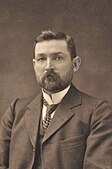Australian federal election, 1906
|
|
|||||||||||||||||||||||||||||||||||||||||||||||||||||||||||
|
|||||||||||||||||||||||||||||||||||||||||||||||||||||||||||
|
|||||||||||||||||||||||||||||||||||||||||||||||||||||||||||
|
|||||||||||||||||||||||||||||||||||||||||||||||||||||||||||
Federal elections were held in Australia on 12 December 1906. All 75 seats in the House of Representatives, and 18 of the 36 seats in the Senate were up for election. The incumbent Protectionist Party minority government led by Prime Minister of Australia Alfred Deakin retained government, despite winning the least amount of House of Representatives votes and seats of the three parties, with the parliamentary support of the Labour Party led by Chris Watson, while the Anti-Socialist Party (renamed from the Free Trade Party) led by George Reid remained in opposition.
Watson resigned as Labour leader in October 1907 and was replaced by Andrew Fisher. The Protectionist minority government fell in November 1908 to Labour, a few days before Reid resigned as Anti-Socialist leader, who was replaced by Joseph Cook. The Labour minority government fell in June 1909 to the newly formed Commonwealth Liberal Party led by Deakin. The party was formed on a shared anti-Labour platform as a merger between Deakin, leader of the Protectionists, and Cook, leader of the Anti-Socialists, in order to counter Labour's growing popularity. The merger didn't sit well with several of the more liberal Protectionists, who defected to Labour or sat as independents.
...
Wikipedia



